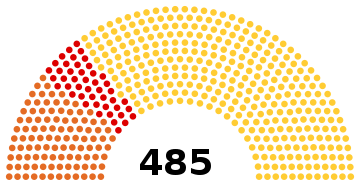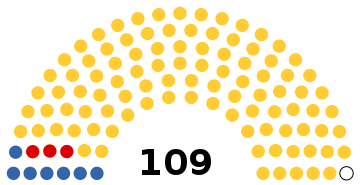Elections in the Democratic Republic of the Congo
Direct elections in the Democratic Republic of the Congo occur for the Presidency, National Assembly (lower house of the legislature), and provincial assemblies. The Senate, the upper house of the legislature, is elected indirectly by members of the provincial assemblies.
 |
|---|
| This article is part of a series on the politics and government of the Democratic Republic of the Congo |
|
Government |
|
Judiciary |
|
| United Nations Mission |
|
|
The 1960 elections, held just before independence, saw Patrice Lumumba become prime minister and Joseph Kasavubu president. In 1965 Mobutu Sese Seko seized power and declared himself president amid the Congo Crisis. He was formally formally elected to a seven-year term in 1970. Establishing the single-party Republic of Zaire, his presidency was renewed by show elections in 1977 and 1984 while legislative elections were abolished altogether by 1975. Mobutu ruled until 1997 when Laurent Kabila seized power after the First Congo War. When Laurent Kabila was killed in 2001, his son Joseph Kabila took over the presidency while the country was going through the Second Congo War (1998–2003). The Second Congo War was officially declared over in 2003. The period that followed was relatively peaceful, with the United Nations' largest peacekeeping force maintaining the peace. However, the Ituri Conflict marred the peace, with periods of violence in the northeastern Ituri Province. In December 2005 a referendum on a new constitution was held. It was approved, paving way for the first multiparty elections in 46 years.
The first multi-party elections in the country since 1960 took place in July 2006. Kabila was elected president and was reelected in 2011. His constitutionally-mandated term ended in 2016, but the government put off a new election, citing logistical problems and the ongoing conflict in the eastern DRC. The long delayed general election finally took place on 30 December 2018, which resulted in a surprise victory for Félix Tshisekedi, although this was questioned by election observers and led to accusations of voter fraud by another opposition candidate, Martin Fayulu. The Constitutional Court of the DRC dismissed Fayulu's challenge of the result, confirming Tshisekedi as the winner. Joseph Kabila stepped down in January 2019, with Tshisekedi being inaugurated as the 5th President of the DRC on January 24. This was the first democratic transition of power in the country since it gained independence in 1960.
Latest elections
2018 presidential election
| Candidate | Party | Votes | % | |
|---|---|---|---|---|
| Félix Tshisekedi | Union for Democracy and Social Progress | 7,051,013 | 38.57 | |
| Martin Fayulu | Dynamic of Congolese Political Opposition | 6,366,732 | 34.83 | |
| Emmanuel Ramazani Shadary | Independent | 4,357,359 | 23.84 | |
| Jean-Philibert Mabaya Gizi Amine | Rainbow of Congo | |||
| Marie-Josée Ifoku | Alliance of Elites for a New Congo | |||
| Radjabho Tebabho Soborabo | Congolese United for Reform | |||
| Pierre Honoré Kazadi Lukonda Ngube-Ngube | People's Front for Justice | |||
| Seth Kikuni | Independent | |||
| Tryphon Kin-Kiey Mulumba | Independent | |||
| Charles Luntadila | Independent | |||
| Sylvain Maurice Masheke | Independent | |||
| Joseph Maluta | Independent | |||
| Francis Mvemba | Independent | |||
| Theodore Ngoy Ilunga wa Nsenga | Independent | |||
| Alain Daniel Shekomba | Independent | |||
| Noel K Tshiani Muadiamvita | Independent | |||
| Gabriel Mokia Mandembo | Movement of Congolese Democrats | |||
| Yves Mpunga | Premier Political Force | |||
| Samy Badibanga | The Progressives | |||
| Invalid/blank voted | – | |||
| Total | 18,329,318 | |||
| Registered voters/turnout | 47.56 | |||
| Source: Jeune Afrique[1] | ||||
2018 parliamentary election
 | |||||||
| Party or alliance | Votes | % | Seats | +/– | |||
|---|---|---|---|---|---|---|---|
| FPTP | PR | Total | |||||
| People's Party for Reconstruction and Democracy (PPRD) | 52 | 56 | 108 | ||||
| Alliance of Democratic Forces of Congo and Allies (AFDC-A) | 41 | 68 | 109 | ||||
| Union for Democracy and Social Progress-Tshisekedi (UDPS/Tshisekedi) | 32 | 43 | 75 | ||||
| Alternative Action for Well-being and Change (AAB) | 32 | 43 | 75 | ||||
| People's Party for Peace and Democracy (PPPD) | 21 | 46 | 67 | ||||
| Social Movement (MS) | 23 | 25 | 48 | ||||
| Alliance of Actors for Good Governance of Congo (AABC) | 22 | 24 | 46 | ||||
| Movement for the Liberation of the Congo (MLC) | 22 | 23 | 45 | ||||
| Alliance of Democrats for Renewal and Progress (ADRP) | 21 | 24 | 45 | 45 | |||
| Alliance of Movements of Kongo (AMK) | 21 | 20 | 41 | 41 | |||
| Group of 7 (G7) | 10 | 26 | 36 | ||||
| Action of allies to improve living conditions for the Congolese (AAAC) | 10 | 26 | 36 | ||||
| Alliance for Building an Emerging Congo (ABCE) | 11 | 23 | 34 | 34 | |||
| Future of Congo (ACO) | 12 | 20 | 32 | 32 | |||
| Rally for the Reconstruction of Congo (RRC) | 11 | 23 | 34 | ||||
| CCU Political Alliance and Allies (ALLIANCE) | 8 | 15 | 23 | ||||
| Alliance for Democratic Alternative (AAD) | 7 | 15 | 22 | ||||
| Christian Democrat Party (PDC) | 11 | 11 | 22 | ||||
| Congolese Party for Development (PCD) | 11 | 11 | 22 | ||||
| Unified Lumumbist Party and allies (PALU-A) | 17 | 20 | 37 | ||||
| Union for the Congolese Nation (UNC) | 14 | ||||||
| Dynamic of the Opposition (DO) | |||||||
| Social Movement for Renewal (MSR) | |||||||
| Together for Change (EPC) | |||||||
| Our Congo (CNB) | |||||||
| Rally for Congolese Democracy (RCD) | |||||||
| Other | - | ||||||
| Independents | |||||||
| Postponed | 1 | 14 | 15 | - | |||
| Common Front for the Congo (PPRD-PPPD-AFDC-AAB-others) | 337 | ||||||
| Lamuka Coalition (DO-MLC-EPC-PALU-CNB-MSR) | 94 | ||||||
| Direction for Change Coalition (UDPS/Tshisekedi-UNC) | 46 | ||||||
| Invalid/blank votes | 168,136 | – | – | – | – | – | |
| Total | 18,329,318 | 100 | 60 | 440 | 500 | 0 | |
| Registered voters/turnout | 38,542,138 | 47.56 | – | – | – | – | |
| Source: Digital Congo | |||||||
2018 provincial elections
| Party | Votes | % | Seats | +/- | |||
|---|---|---|---|---|---|---|---|
| FPTP | PR | Total | |||||
| Alliance of Democratic Forces of Congo and Allies (AFDC-A) | 68 | ||||||
| People's Party for Reconstruction and Democracy (PPRD) | 56 | ||||||
| People's Party for Peace and Democracy (PPPD) | 46 | ||||||
| Alternative Action for Well-being and Change (AAB) | 45 | ||||||
| Union for Democracy and Social Progress-Tshisekedi (UDPS-Tshisekedi) | 43 | ||||||
| Action of allies to improve living conditions for the Congolese (AAAC) | 26 | ||||||
| Group of Seven (G7) | 26 | ||||||
| Social Movement (MS) | 25 | ||||||
| Alliance of Actors for Good Governance of Congo (AABC) | 24 | ||||||
| Alliance of Democrats for Renewal and Progress (ADRP) | 24 | ||||||
| Alliance for Building an Emerging Congo (ABCE) | 23 | ||||||
| Movement for the Liberation of the Congo (MLC) | 22 | ||||||
| Rally for the Reconstruction of Congo (RRC) | 22 | ||||||
| Alliance of Movements of Kongo (AMK) | 21 | ||||||
| Unified Lumumbist Party and Allies (PALU-A) | 20 | ||||||
| Future of Congo (ACO) | 20 | ||||||
| CCU Political Alliance and Allies (ALLIANCE) | 15 | ||||||
| Alliance for Democratic Alternative (AAD) | 15 | ||||||
| Congolese Party for Development (PCD) | 11 | ||||||
| Other | - | ||||||
| Independents | |||||||
| Votes cast | |||||||
| Blank or invalid votes | |||||||
| Total | 100 | 715 | 65 | 780 | |||
| Abstentions | |||||||
| Turnout | 40,024,897 | ||||||
2019 Senate election
 | |||
| Party | Seats | +/- | |
|---|---|---|---|
| Common Front for the Congo | 99 | ||
| Lamuka Coalition | 6 | ||
| Coalition for Change | 3 | ||
| Senator for life | 1 | New | |
| Total | 109 | ||
See also
- Electoral calendar
- Electoral system
External links
- Electionworld
- Adam Carr's Election Archive
- African Elections Database
- Looking at the Congo's Historic Moment An index of resources from the Woodrow Wilson Center on the DRC's democratic
- A local and an international perspectives on the 2011 elections on 28 November 2011
transition; Last update August 1, 2006
References
- "RDC : Félix Tshisekedi élu président, selon les résultats provisoires". 10 January 2019.
- "La Carte politique de la RDC après les législatives du 30 décembre 2018". Archived from the original on 2019-01-23. Retrieved 2019-03-22.
- "RDC : après l'Assemblée nationale, le FCC de Kabila remporte la majorité absolue au Sénat". Archived from the original on 2019-03-21. Retrieved 2019-03-22.